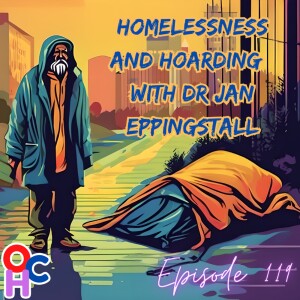
Friday Dec 01, 2023
#119 Homelessness and hoarding with Dr Jan Eppingstall of Stuffology
Subscribe to the podcast - https://www.overcomecompulsivehoarding.co.uk/subscribe
In today's episode, Dr Jan Eppingstall and I will be diving into a topic that is rarely discussed - homelessness and hoarding. We will explore the limited research available on the connection between these two issues and the complex factors that contribute to both. We uncover the connections between trauma, loss, and mental health issues that can lead to both homelessness and hoarding behaviours as well as the instincts associated with hoarding and the difficulties in interrupting these instincts.
- Homelessness and hoarding: connections and similarities
- Lack of hoarding-related academic articles
- Homelessness can be caused by hoarding
- Lack of support, finger pointing, no understanding
- Excessive stuff brings hope for normal future
- A sense of safety motivates us to accumulate possessions
- The physical barrier between us and the chaotic outside world is important
- Excess stuff can be seen as hope for a better future
- Society pressures us to make a perfect home
- Epigenetics, trauma, and genes influence hoarding behaviour
- Poverty pushes some to become hoarders
- Humans want to share during crises
- Neurodivergence, brain injuries, schizophrenia
- Homelessness and hoarding have similarities, including trauma, mental health issues, and fear of scarcity
- Possessions may be portable but excessive saving behaviour persists
- Homelessness caused by hoarding; trauma leads to hoarding in new home
- Need to ask "What do you need?"
- The comfort of material possessions
- Possible evidence of neurodivergence or organic brain injuries, schizophrenia, depression, obsessive-compulsive disorder, complex post-traumatic stress disorder
- The importance of asking the right questions and providing appropriate support
- Approach problems from various angles and keep iterating to find what works
- Short-term focus of government hinders this
- Homeless individuals trading stuff and the instinct to hoard when they find secure housing
- Difficulty in interrupting the primal hoarding instinct
- Strategies for interrupting the instinct, such as calculations and sharing with others in need
- Need for a holistic approach and joined-up thinking to address hoarding and homelessness effectively
- Lack of resources and understanding to support hoarders once they are housed
- Treating hoarders with dignity and respect
- Importance of appropriate questions and support due to the complexity of hoarding behaviours
- Lack of support and assistance in addressing the root causes of homelessness
- Sense of control and safety that possessions offer
- Importance of addressing the additional traumas faced by homeless individuals
- Study finding higher hoarding prevalence (18.5%) among homeless individuals compared to the general population (1.5-5%)
- Oversampling technique used to study rare subpopulations
- Overlapping risk factors of hoarding and homelessness (trauma, grief, brain injury, neurodivergence)
- Sense of safety and need to create a home driving the accumulation of possessions
- Scarcity mindset and stockpiling items due to homelessness
- Epigenetic processes potentially turning on genes associated with hoarding as a coping mechanism
- Poverty and uncertainty about basic necessities contributing to hoarding behaviors
- Importance of listening to frontline practitioners and individuals in order to understand their needs
Hosted on Acast. See acast.com/privacy for more information.
No comments yet. Be the first to say something!